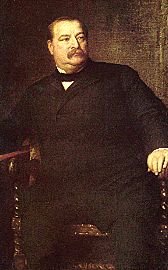
The following is excerpted from Mencken's review of the Allan Nevins biography Grover Cleveland: a Study in Courage. The review was originally published in the January 1933 issue of American Mercury.
* * *
We have had more brilliant Presidents than Cleveland, and one or two who were considerably more profound, but we have never had one, at least since Washington, whose fundamental character was solider and more admirable.
There was never any string tied to old Grover. He got on in politics, not by knuckling to politicians, but by scorning and defying them, and when he found himself opposed in what he conceived to be sound and honest courses, not only by politicans but by the sovereign people, he treated them to a massive dose of the same medicine. No more self-sufficient man is recorded in modern history. There were times, of course, when he had his doubts like the rest of us, but once he had made up his mind he stood immovable. No conceivable pressure could shake him; no conceivable seduction could weaken him. There was something almost inhuman about his fortitude, and to millions of his contemporaries it seemed more satanic than godlike. No President since Lincoln, not even the melancholy Hoover, has been more bitterly hated, or by more people. But Cleveland, though he certainly did not enjoy it—he was, indeed, singularly lacking in the shallower and more comforting sort of egoism—yet did not let it daunt him. He came into office his own man, and he went out without yielding anything of that character for an instant.
In his time it was common to ascribe a good part of this vast steadfastness to his mere bulk. He had a huge girth, shoulders like the Parthenon, a round, compact head, and the slow movements of any large animal. He was not very tall, but he looked, somehow, like an enormous natural object—say, the Jungfrau or Cape Horn. This aspect of the stupendous, almost of the terrific, was tempting to the primeval psychologists of that innocent day, and they succumbed to it easily. But in the years that have come and gone since then we have learned a great deal about fat men. It was proved, for example, by W.H. Taft that they could be knocked about and made to dance with great facility, and it was proved by Hoover that their texture may be, not that of the Alps, but that of chocolate éclairs. Cleveland, though he was also fat, was the complete antithesis of these gentlemen. There was far more to him than beam and tonnage. When enemies had at him they quickly found that his weight was the least of their difficulties; what really sent them sprawling was the fact that his whole huge carcass seemed to be made of iron. There was no give in him, no bounce, no softness. He sailed through American history like a steel ship loaded with monoliths of granite.
It is not likely that we shall see his like again, at least in the present age. The Presidency is now closed to the kind of character that he had so abundantly. It is going, in these days, to more politic and pliant men. They get it by yielding prudently, by changing their minds at the right instant, by keeping silent when speech is dangerous. Frankness and courage are luxuries confined to the more comic varieties of runners-up at national conventions. Thus it is pleasant to remember Cleveland, and to speak of him from time to time. He was the last of the Romans. If pedagogy were anything save the puerile racket that it is he would loom large in the schoolbooks. As it is, he is subordinated to Lincoln, Roosevelt and Wilson. This is one of the things that are the matter with the United States.1
— H.L. Mencken
Copyright © 2000, The Daily Objectivist - Reprinted with permission of The Daily Objectivist and Davidmbrown.com.
12 Dec 2008 (last edit: 12 Sep 2024)
You can assist the work of Freedom Circle by purchasing one of the works discussed above:
-
H. L. Mencken, "The Library: A Good Man in a Bad Trade", The American Mercury, Volume XXVIII, Number 109, January 1933, pp. 125-127. (Freedom Circle note) ↩︎
